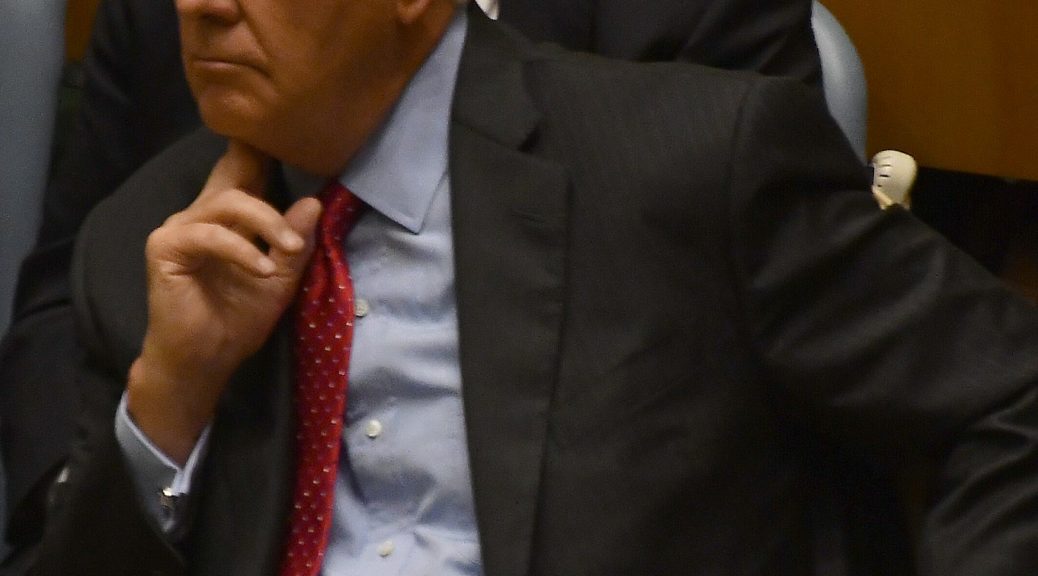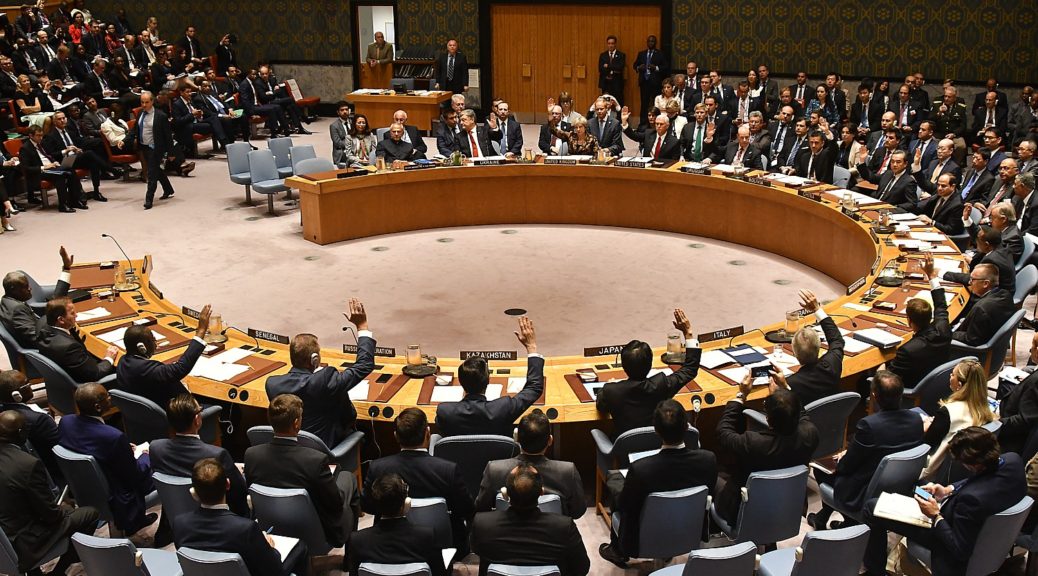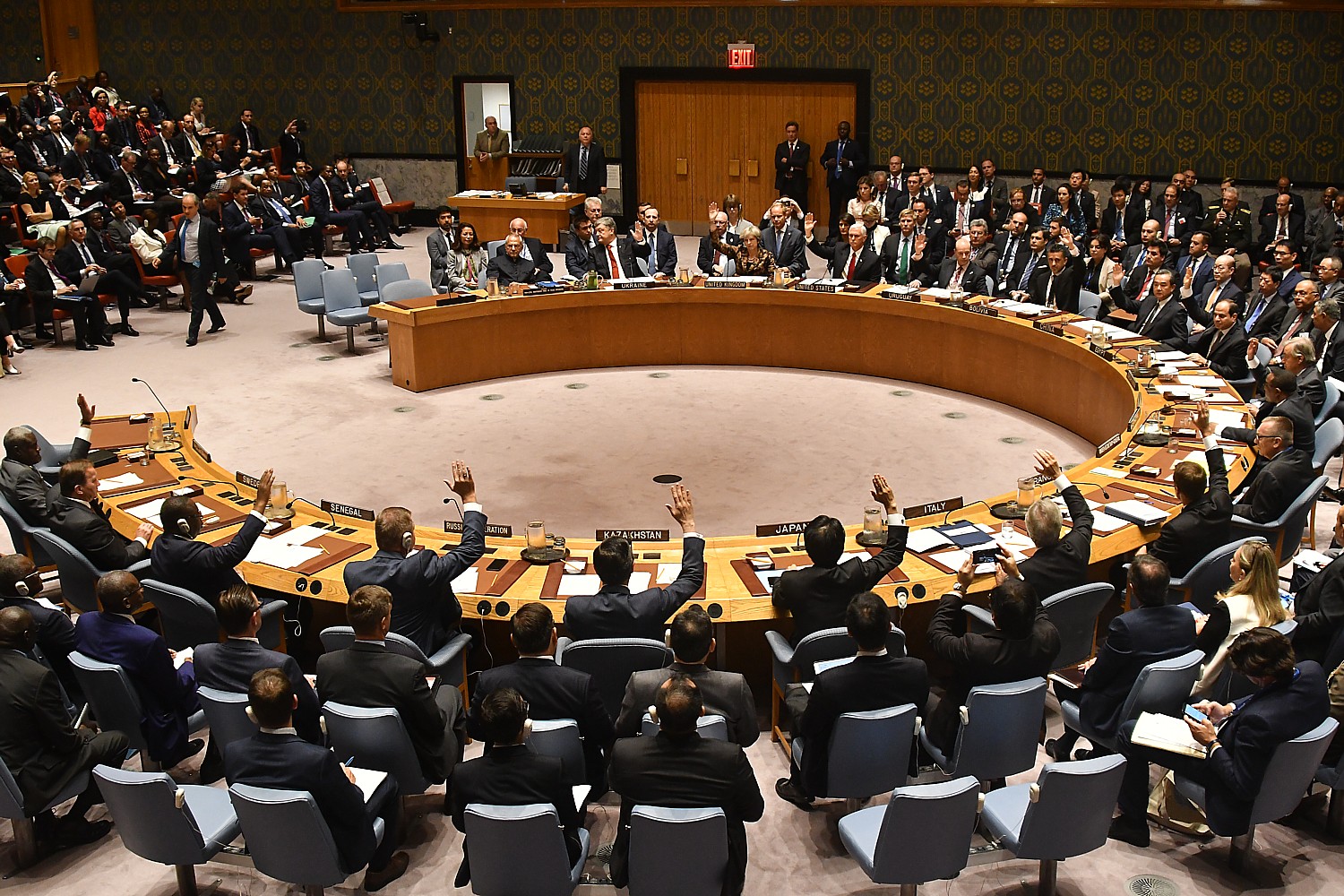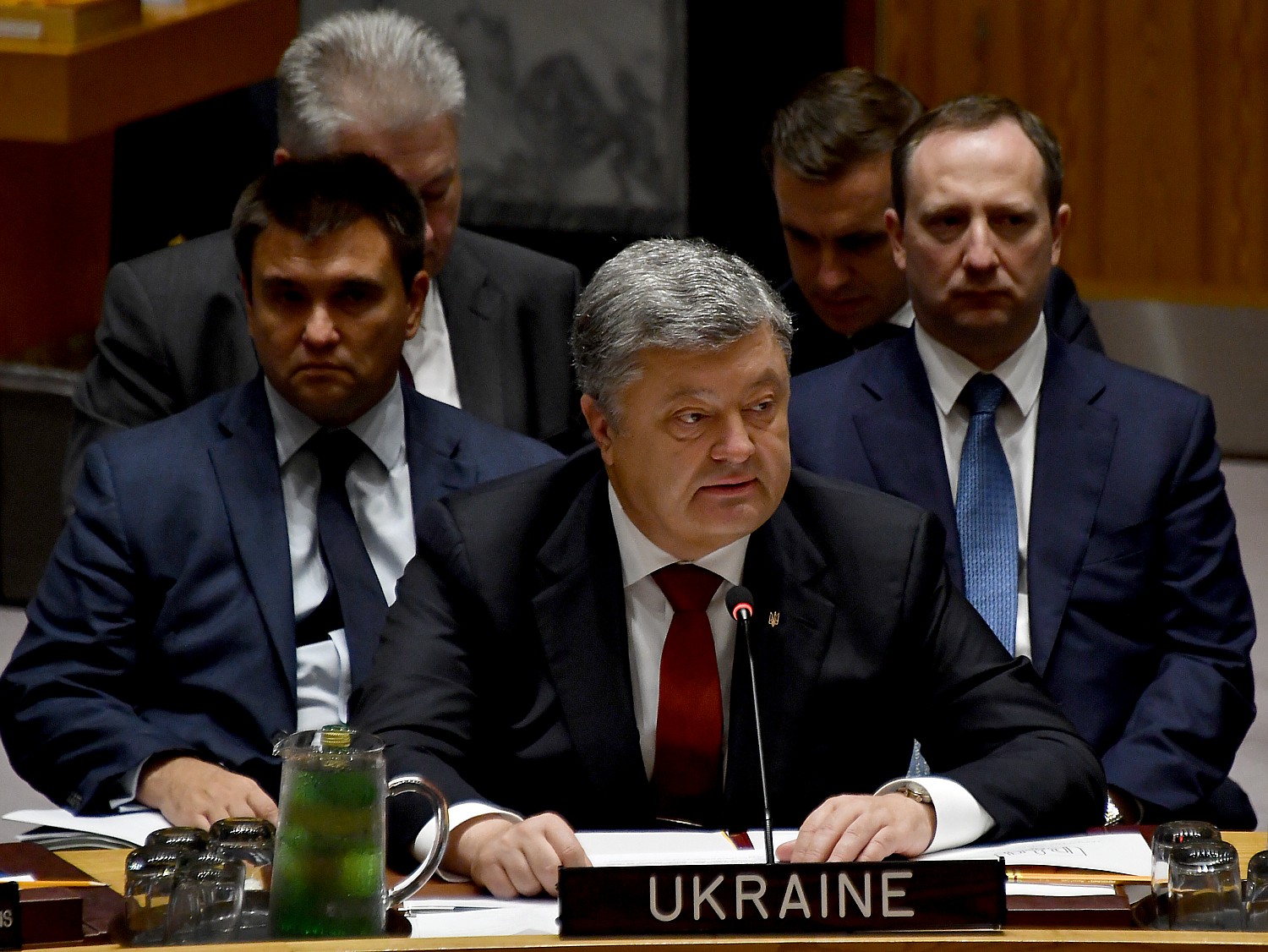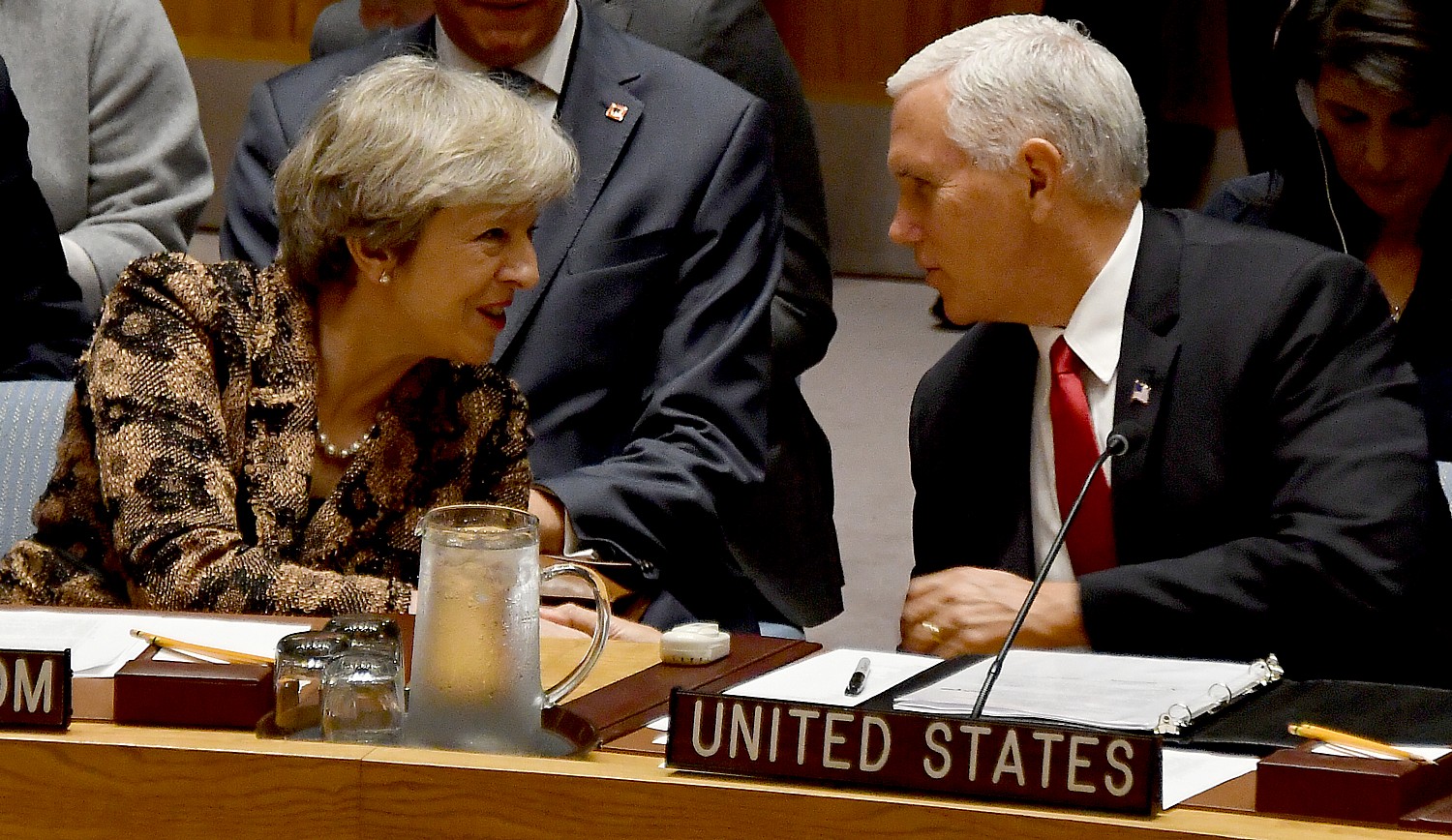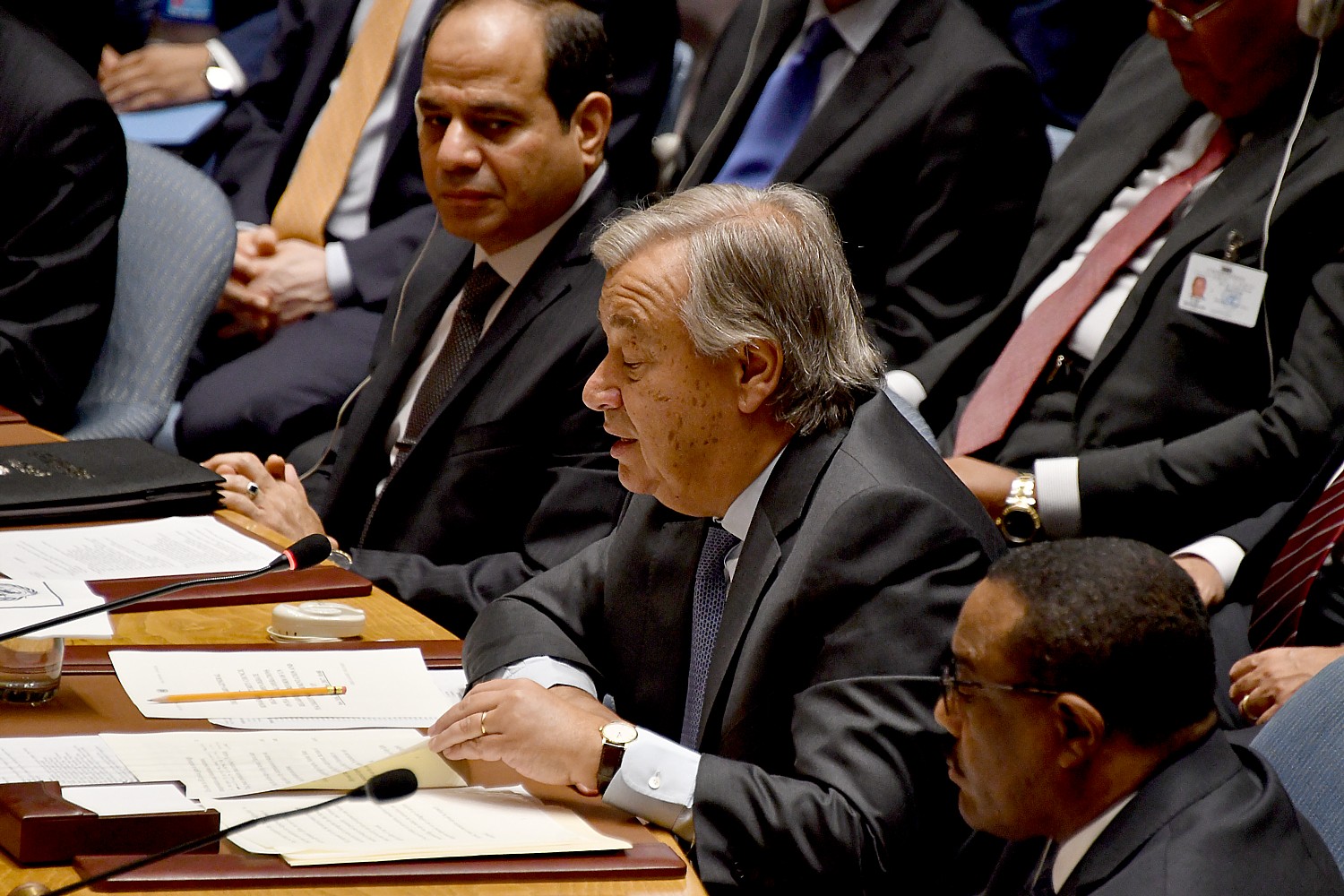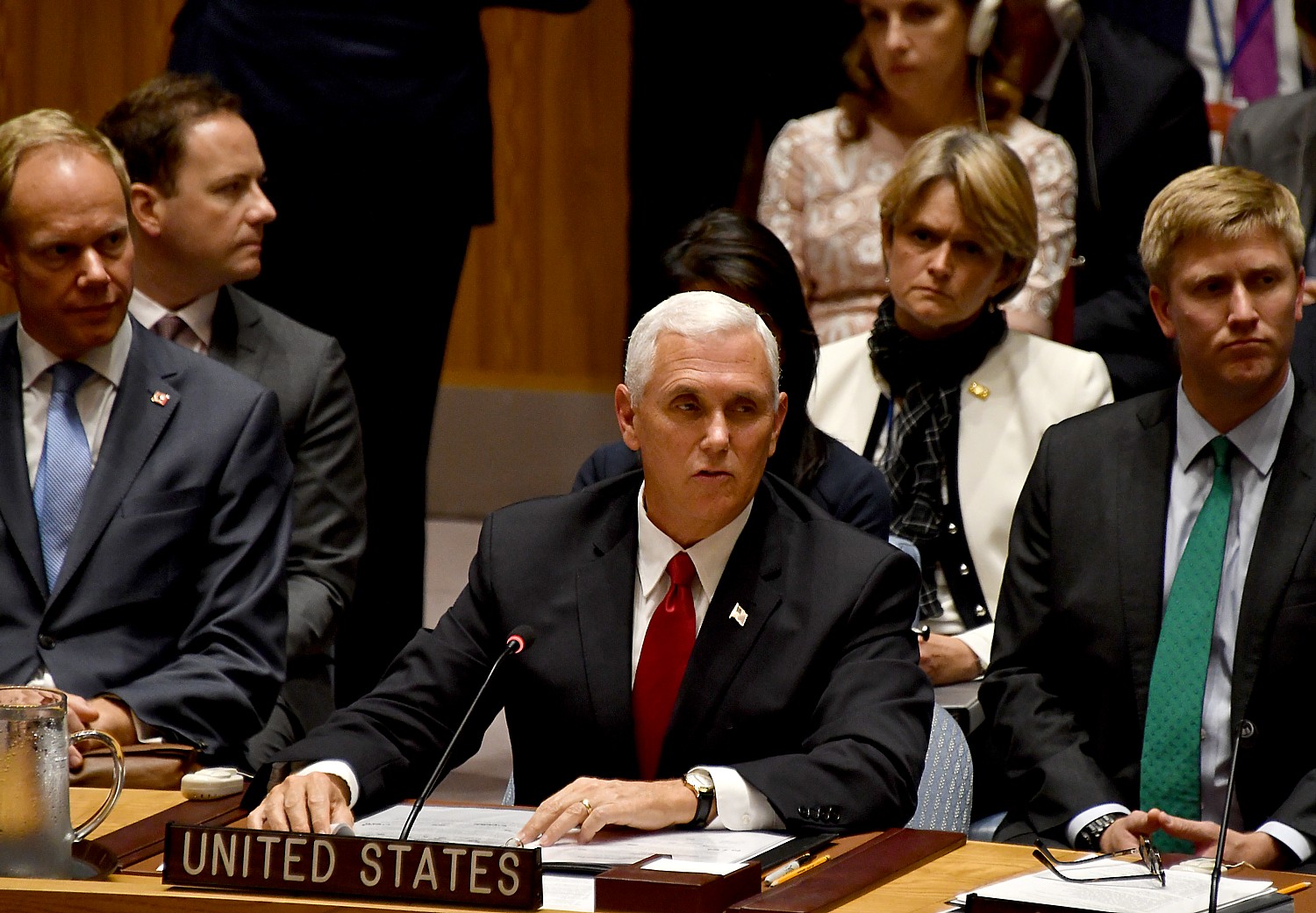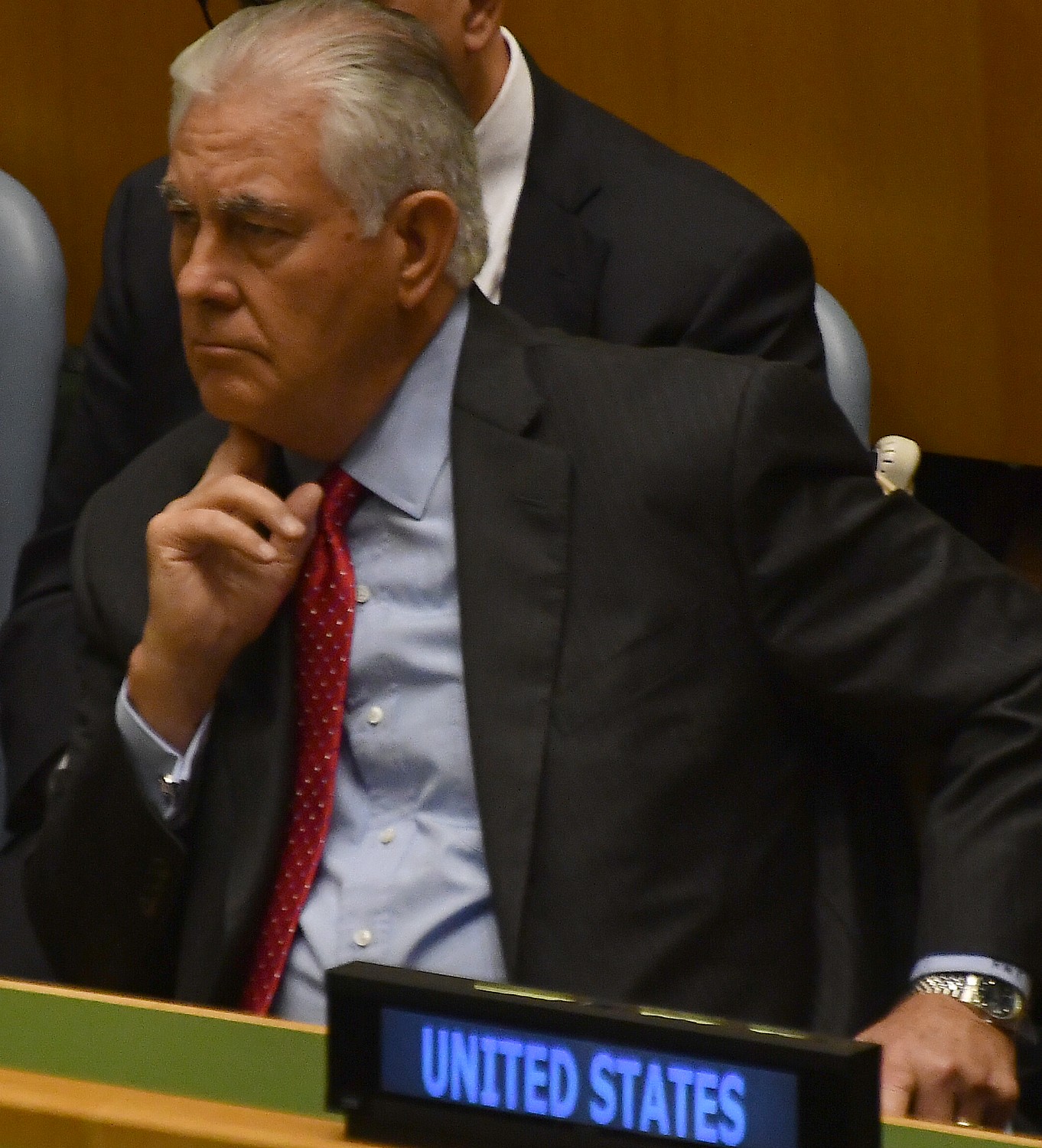
United States Calls Pyongyang Non-proliferation ‘Case Study’, While Russian Federation Cites Fate of Former Iraqi, Libyan Leaders
(This account from the United Nations news bureau)
The de-escalation of tensions on the Korean Peninsula should flow from the lessons generated by the diplomacy that shaped the agreement on Iran’s nuclear program, speakers in the Security Council said today.
During a ministerial-level briefing on the threat posed by the spread of weapons of mass destruction and the best ways to halt the flow, speakers shared grave concerns about the Democratic People’s Republic of Korea’s recent nuclear and ballistic missile tests, many urging swift collective action.
Kairat Abdrakhmanov, Kazakhstan’s Minister for Foreign Affairs, said the Joint Comprehensive Plan of Action on Iran’s nuclear program had placed that country on a nuclear-free path, adding that “we should, therefore, convincingly show Pyongyang the right ‘road map’.”
Workineh Gebeyehu Negewo, Ethiopia’s Minister for Foreign Affairs, agreed, describing the Plan of Action as one of multilateralism’s most significant achievements and an important example of diplomacy at work. It could guide the Council and the international community in exploring mechanisms to address the serious and imminent threat posed by the Democratic People’s Republic of Korea, he said, adding that Pyongyang’s continuous provocative actions should not weaken Council unity.
Rex W. Tillerson, Secretary of State of the United States, described the Democratic People’s Republic of Korea as a case study in why nations should work towards non-proliferation. The country had joined the Treaty on the Non-Proliferation of Nuclear Weapons in the mid-1980s, but had never entered into full compliance, he said. That situation offered lessons for Iran, which was on its way to developing its own nuclear weapons, he said. Countries that had given up their nuclear arsenals had travelled on a positive trajectory, demonstrating that acquiring nuclear capability did not provide security. Rather, it presented a path to isolation and scrutiny by the global community, he said.
Vassily A. Nebenzia (Russian Federation) questioned that notion, saying the use of non-proliferation mechanisms to exert pressure on non-popular regimes was well known. He cited the fate of Saddam Hussein, who had no weapons of mass destruction, and Muammar Qadhafi, who had voluntarily renounced his own nuclear-weapons program. While those facts did not justify Pyongyang’s weapons program, it would be short-sighted to ignore the reason behind it, he said. Another reason for the tension in the region was the absence of any mechanism to provide security for all North-East Asian States, he said, adding that implementing the Russian-Chinese initiative would be a step in the right direction.
Wang Yi, China’s Minister for Foreign Affairs, underscored the importance of promoting the resumption of talks and dialogue with the Democratic People’s Republic of Korea while exerting pressure through sanctions. Emphasizing that countries must pursue sustainable security for all, and not just for themselves, he said pressure was necessary where appropriate if they violated rules. However, sanctions were not the panacea, he stressed, cautioning that confrontation and sanctions would only lead to escalation.
Kang Kyung-Wha, Minister for Foreign Affairs of the Republic of Korea, underlined the need for the Council and the international community to stand together and send a unified message. The Democratic People’s Republic of Korea had conducted two nuclear tests and launched 24 ballistic missiles in the past year, she noted, warning that continuing such actions would deal a crippling blow to the international non-proliferation regime.
Tarō Kōno, Japan’s Minister for Foreign Affairs, voicing great concern about Pyongyang’s recent ballistic missile launch over his country, warned that “no bright future awaits North Korea if it continues on its present path” and all Member States must fully and promptly implement the relevant resolutions.
Briefing the Council at the outset, Izumi Nakamitsu, High Representative for Disarmament Affairs, said that the same unity demonstrated in reining in weapons stockpiles and programs in Iraq, Iran, Libya and Syria was needed to address Pyongyang’s provocative and dangerous nuclear and ballistic missile activities. “The most effective approaches to non-proliferation must involve a mixture of active, robust and wise diplomacy, strong international cooperation and a strong commitment to fully implement the decisions of the Council,” she said. “Addressing the threats and risks posed by weapons of mass destruction will also require new and creative efforts to complete unfinished business, including the achievement of a world without nuclear weapons.”
During the debate, speakers also discussed several non-proliferation initiatives, from Council resolution 1540 (2004), aimed at preventing non-State actors from acquiring weapons of mass destruction and related materiel, to the signing of the Treaty to Prohibit Nuclear Weapons at Headquarters on 20 September.
Enrique Loedel, Uruguay’s Vice-Minister for Political Affairs, noted that permanent Security Council members supplied 75 per cent of the world’s weapons. The goal of general and complete disarmament was far from being realized, as most recently seen in the marked absence of nuclear-weapon-States at the signing of the Treaty to Prohibit Nuclear Weapons, he noted.
However, Mark Field, the United Kingdom’s Minister of State for Asia and the Pacific, said his country’s Government did not believe that instrument was helpful.
Meanwhile, some ministers called for scrupulous adherence to existing instruments, with many agreeing that nuclear-weapon-free zones should blaze the trail towards ridding the world of such arms.
SAMEH HASSAN SHOKRY SELIM, Egypt’s Minister for Foreign Affairs, said the Middle East remained an example of the Security Council’s selective handling of threats to the non-proliferation regime. It had failed to implement resolution 687 (1991), which contained an explicit recognition of the need to establish a nuclear-weapons-free zone in the Middle East, he said.
Also participating in the debate were ministers and other officials representing Ukraine, Sweden, Italy, France, Senegal and Bolivia.
The meeting began at 4:36 p.m. and ended at 7:01 p.m.
Briefing
IZUMI NAKAMITSU, High Representative for Disarmament Affairs, recalled that in 1991, the Council had called upon Iraq to eliminate its weapons of mass destruction program, and had effectively normalized that country’s international non-proliferation obligations. On Iran’s nuclear issue, direct engagement and a commitment to dialogue had resulted in the Joint Comprehensive Plan of Action, which the Council had endorsed in resolution 2231 (2015). As inspectors continued to verify its implementation, a sustained commitment by all remained essential for the historic agreement’s success, she said.
The Council had also taken timely action to ensure the removal of vulnerable chemical weapons stockpiles in Libya, she continued, noting also that, through successful engagement by the Russian Federation and the United States, Syria had eliminated its chemical weapon program. Regrettably, evidence of chemical weapons use continued to appear in that country, she noted, emphasizing that those responsible must be held accountable. The Council’s unity and action was essential in that regard.
Turning to the Democratic People’s Republic of Korea, she said that country’s provocative and dangerous nuclear and ballistic missile activities continued, in defiance of the Council’s decisions and of the will of the international community, undermining global norms against nuclear proliferation and nuclear testing. Following the Secretary-General’s repeated calls for the Democratic People’s Republic of Korea to cease further testing, comply with Council resolutions and resume dialogue on denuclearization, its steady escalation of those actions must be reversed immediately, she said, reiterating the need for Council unity in that regard.
Reminding members that resolution 1540 (2004) remained a pioneering achievement in cooperative action to prevent non-State actors from acquiring weapons of mass destruction and related materiel, she emphasized that maintaining its effectiveness would require keeping pace with global trends and emerging technologies that continuously lowered the threshold for the acquisition and use of chemical, biological, radiological and nuclear material. “The most effective approaches to non-proliferation must involve a mixture of active, robust and wise diplomacy, strong international cooperation and a strong commitment to fully implement the decisions of the Council,” she stressed. “Addressing the threats and risks posed by weapons of mass destruction will also require new and creative efforts to complete unfinished business, including the achievement of a world without nuclear weapons.”
Statements
REX W. TILLERSON, Secretary of State of the United States, said members of the Security Council talked often about threats to global security, noting that the current nuclear proliferation issue had worldwide implications. The positive trajectory of countries that had given up their nuclear weapons and the enormous responsibility of their stewardship meant that acquiring nuclear capability did not provide security but rather, presented a path to isolation and scrutiny by the global community. The current nuclear Powers should commit to sound practices and robust non-proliferation efforts to keep such weapons out of the hands of others, including terrorists and non-State actors, he said.
Recalling that Belarus, Kazakhstan, Ukraine and South Africa had all weighed the risks and made the decision to give up their nuclear programs or weapons, he noted that Kazakhstan, in partnership with the United States, had opted to join the Treaty on the Non-proliferation of Nuclear Weapons as a non-nuclear State. Ukraine had made a similar choice after the Russian Federation’s incursion onto its territory. The United States was the only nation to have used nuclear weapons in warfare and it bore a responsibility to reduce nuclear dangers, he said, recalling that potential human extinction had loomed during the Cuban missile crisis, when the predominant emotion had been fear.
He went on to note that the Republic of Korea had opted not to pursue nuclear weapons and had grown into one of the world’s great Powers. By contrast, the Democratic People’s Republic of Korea may assume that nuclear weapons would assure regime survival, but instead, they would lead to isolationism and ignominy, he said. Threats would not create safety for the regime but rather, would stiffen the resolve of the United States, he warned. The Democratic People’s Republic of Korea was a case study in why nations should work towards non-proliferation. It had joined the Non-Proliferation Treaty in the mid-1980s, but had never entered into full compliance, he recalled, saying the matter had lessons for Iran, which was on its way to developing its own nuclear weapons. That country seemed keen to preserve for itself the right to resume such efforts in the future.
The Russian Federation and the United States shared the greatest responsibility to stop the spread of nuclear weapons, he affirmed. The two had cooperated together well in drafting the text of what would become the Non-Proliferation Treaty, but in recent years, the Russian Federation had behaved in ways that weakened global norms, violating its own obligations and flouting the security assurances it had made at the end of the cold war. Cooperation from China was essential if Pyongyang’s threats were to be brought under control, he continued. If China desired to help rid that country of nuclear weapons, it was time to work with the rest of the international community. Non-State actors, if given the chance, would seek death and destruction on a larger scale, he warned, pointing out that there was no scale larger than a nuclear attack. The international community must work to secure nuclear technology and disrupt proliferation networks.
KAIRAT ABDRAKHMANOV, Minister for Foreign Affairs of Kazakhstan, said that deliberate non-compliance with sanctions resolutions undermined collective efforts for the maintenance of peace and stability. There was need to develop concrete mechanisms that would dissuade nuclear-weapon-possessing States that regularly violated resolutions on weapons of mass destruction. Concerning the Democratic People’s Republic of Korea, he took note of the Council’s dilemma, whereby a military solution was not an option but launching a negotiation process was also not easy. Condemning Pyongyang’s actions, he said the continued pressure of sanctions was a step in the right direction. Kazakhstan called upon all parties to reduce tensions he said, urging consideration of the joint proposals by China and the Russian Federation. The role of the Secretary-General as mediator could not be underestimated, he emphasized.
Turning to the Joint Comprehensive Plan of Action on Iran’s nuclear program, he stressed that the agreement had put Iran on a nuclear-free path. “We should, therefore, convincingly show Pyongyang the right ‘road map’,” he said, pointing out that the Joint Plan had been realized while sanctions were in play. Regarding the use of chemical weapons in Syria, he stressed that the Council must be united in its approach. Kazakhstan would continue to provide the Astana platform to facilitate a political solution, he said. The country would also continue to support the cooperation mechanism spelled out in resolutions 1540 (2004), he added, noting that his country was an active participant in its work, as demonstrated by its allocation of $50,000 earlier this month. The good of humanity must be placed above national interests so as to keep the world safe from weapons of mass destruction, he stressed.
SAMEH HASSAN SHOKRY SELIM, Minister for Foreign Affairs of Egypt, said the total, verifiable and irreversible elimination of nuclear weapons would depend largely on nuclear-weapon States fulfilling their obligations under article VI of the Non-Proliferation Treaty. However, that goal remained hostage to misconceptions pertaining to strategic stability. “It is time for us, members of the United Nations, to have an honest and inclusive discussion,” he said. That discussion must question the argument that possession of nuclear weapons and reliance on nuclear deterrence contributed to international security and stability. It was misleading to address non-proliferation while disregarding disarmament, or selectively tackling cases of non-compliance, while ignoring the universal nature of the Treaty.
He expressed full support for the Council’s quest for a peaceful solution to the Democratic People’s Republic of Korea’s nuclear activities, supervision of Iran’s compliance and the establishment of credible facts on the use of chemical weapons in Syria. However, the Middle East continued to be an example of the Security Council’s selective manner in addressing threats to the non-proliferation regime, he continued, pointing out that the Council had failed to implement resolution 687 (1991), which contained explicit recognition of the aim to establish a nuclear-weapons-free zone in the Middle East. Furthermore, there was frustration, particularly in the Arab countries, due to repeated failures in undertaking efforts to establish a zone free of nuclear weapons, as stated in the resolution on the Middle East during the 1995 Non-Proliferation Treaty Review Conference. Moreover, the decision by three of the Treaty’s States parties to block consensus on the final document of the 2015 Review Conference was disappointing, he said, underlining that the enforcement of disarmament and non-proliferation commitments should be addressed in a more inclusive manner, with all Member States participating.
PAVLO KLIMKIN, Minister for Foreign Affairs of Ukraine, said that 50 years after the Non-Proliferation Treaty’s entry into force, the possible use of such arms remained a threat, with some States still aspiring to create their own capabilities. In Syria, there had been blatant violations of the Convention on the Prohibition of the Development, Production, Stockpiling and Use of Chemical Weapons and on their Destruction (OPCW), he noted. Meanwhile, the risk of dangerous materials falling into the hands of non-State actors had grown. “The mere fact that we have to discuss again how to enforce Security Council resolutions aimed at preventing the spread of weapons of mass destruction clearly proves that the existing system of established norms and principles is eroded,” he said, adding that lack of real accountability for defiance only encouraged further breaches.
The Democratic People’s Republic of Korea was the most appalling case, he continued. Recalling his country’s history under the Soviet Union, he said the rulers had created a famine by selling grain for gold, while using slave labour camps to boost their military and test nuclear weapons on their own people. To reverse the current trend, Council members should set differences aside and use every available tool to ensure full compliance with relevant decisions, he said. To address rapid developments in science and technology, cooperation must be strengthened among all stakeholders.
Ukraine had voluntarily dismantled its nuclear arsenal because it believed in international principles, but “we were too naïve”, he noted. Having confronted aggression by a nuclear-weapon State, with the Russian Federation violating international obligations and undermining the United Nations-based security system, Ukraine was convinced that the global non-proliferation regime would benefit immensely from enforceable security guarantees. “Empty proclamations do not convince anyone anymore,” he said, stressing that the Council must spare no effort to prove that the non-proliferation system worked, otherwise the world map would be redrawn by newly emerged nuclear actors.
MARGOT WALLSTRÖM, Minister for Foreign Affairs of Sweden, called for universal and comprehensive implementation of existing sanctions regimes, in particular the non-proliferation-related sanctions imposed on the Democratic People’s Republic of Korea. The international community must all work together to implement those sanctions fully in order not to help that country’s illegal nuclear weapons and ballistic missiles programs, she said. Improved monitoring and targeted capacity-building were important measures requiring Council and diplomatic engagement.
Turning to Syria, she commended the OPCW and the Joint Investigative Mechanism on having fulfilled their mandate of investigating the use of chemical weapons in that country and identifying those responsible. The Council must stand united to ensure accountability for the perpetrators, she emphasized. In that context she underscored the importance of resolution 2231 (2015) and the Joint Comprehensive Plan of Action, which the High Representative of the European Union for Foreign Affairs and Security Policy had described as “an historic achievement for the security of the region and of the whole world, and a success for multilateral diplomacy that has proven to work and deliver”. It was vital that all parties continue to implement their commitments, she said, while stressing that implementing resolutions was just one side of the coin. “We must also nurture and defend the existing multilateral instruments that we have established to curtail the proliferation of weapons of mass destruction. Unity is key.”
TARŌ KŌNO, Minister for Foreign Affairs of Japan, voiced great concern about Pyongyang’s recent ballistic missile launch over his country, recalling that it had conducted its sixth nuclear test earlier in the month, which was on a far greater scale than previous tests. Those actions not only posed grave challenges to the international non-proliferation regime and violated relevant Security Council resolutions, they also posed an unprecedented and imminent threat to peace and security in the region, including Japan.
“No bright future awaits North Korea if it continues on its present path,” he warned, urging Pyongyang to fully implement the related Council resolutions, including resolution 2374 (2017), and take concrete actions towards the denuclearization of the Korean Peninsula. It must return to compliance with the Non-Proliferation Treaty of Nuclear Weapons and International Atomic Energy Agency (IAEA) safeguards agreement as soon as possible. Denuclearizing the Peninsula would require the strongest possible international pressure on the Democratic People’s Republic of Korea, he emphasized, adding that current measures were insufficient. All Member States must fully and promptly implement the relevant resolutions, he stressed. “No State should be allowed to become a loophole in the North Korea sanctions regime.”
Turning to the non-proliferation of chemical weapons, he reminded Council members about the 1985 sarin gas attack in Japan, underlining that the use of such weapons was unacceptable under any circumstances. He condemned the use of chemical weapons in the town of Khan-Shaykhun, in Syria, while voicing support for the nuclear deal with Iran, which, he noted, was contributing to the international non-proliferation regime and stability in the Middle East. It was extremely important that the Joint Comprehensive Plan of Action be continuously and steadily implemented, he emphasized. However, Iran’s ballistic missile launches were inconsistent with resolution 2231 (2015), he noted, urging that country to play a constructive role in the region.
ANGELINO ALFANO, Minister for Foreign Affairs and International Cooperation of Italy, said non-proliferation should be defended as a guarantee of peace, security and stability. He condemned Pyongyang’s launch of a ballistic missile over Japan on 15 September, saying the Security Council must send a clear message to the Democratic People’s Republic of Korea that any further attempts would backfire. Noting that Iran had moved in a positive direction on its own nuclear program, he said the Joint Comprehensive Plan of Action had delivered gains for global security by imposing strict limits on Tehran’s nuclear program.
However, the deal was just the beginning, and it was important to ensure that Iran did not sway off the path of nuclear non-proliferation, he continued. There had been no progress in Syria, but rather the repeated use of chemical weapons against innocent people. Concerning sanctions against the Democratic People’s Republic of Korea, he emphasized the importance of monitoring their implementation in order to get a precise picture of the country’s compliance. It was also important to address weaknesses in the enforcement of the measures. Sanctions should have an impact on the regime’s proliferation programs, he said, while stressing the need to avoid negative effects on the humanitarian situation.
WANG YI, Minister for Foreign Affairs of China, said non-proliferation still faced challenges, with a few countries defying the international community and conducting tests. Non-State actors may now have access to weapons of mass destruction, and non-proliferation was now a matter of international peace and security. Emphasizing that countries must pursue sustainable security for all, and not just for themselves, he said it was necessary to exert pressure where appropriate if they violated rules.
However, sanctions were not the panacea, he continued, cautioning that confrontation and sanctions would only lead to escalation. Rather, negotiations presented the way out. Non-proliferation must be upheld as a customary international law that was crucial for security and order, having prevented more countries from obtaining weapons of mass destruction, he said. In terms of the Democratic People’s Republic of Korea, he underscored the importance of promoting the resumption of talks and dialogue while exercising sanctions.
JEAN-BAPTISTE LEMOYNE, Secretary of State Attached to the Minister for Europe and Foreign Affairs of France, described the non-proliferation picture as bleak. With the barbaric use of toxic agents in Syria and Iraq, the world was witnessing the re-emergence of weapons thought to have been banished to the annals of history, he said. Concerning the growing risk in the Korean Peninsula, the regime in the Democratic People’s Republic of Korea was pursuing military escalation and had provided evidence of its irresponsible attitude through its actions.
There was also an increasing risk of sensitive technology and goods being diverted, he said, adding that proliferation was no longer the exclusive domain of one type of actor. The risk of non-State actors getting their hands on weapons of mass destruction was now a dangerous reality. The case of Iran confirmed that a proactive attitude on the part of the international community worked, but it must respond to Iran’s stepped-up ballistic missile activity that was not compliant with the relevant Security Council resolution, he said.
MARK FIELD, Minister of State for Asia and the Pacific of the United Kingdom, said the proliferation of weapons of mass destruction was the gravest of international security concerns. Shared rules and norms were designed to keep the world safe, and the Council had the responsibility to respond when such weapons were used, he said, adding that nations should implement measures imposed by the Council and go further when the situation required.
A system of sanctions had been developed against the Democratic People’s Republic of Korea, he said, recalling that Secretary of State Tillerson had made it clear that regime change and accelerated reunification of the Korean Peninsula were not desirable. Nor was it desirable to harm the people of the Democratic People’s Republic of Korea, who suffered deprivation and hardship. That was why that nation should be pressed to respect the Council’s resolutions and change its reckless course, he said.
Turning to Iran, he said the multilateral system delivered results, noting Tehran had rolled back its nuclear program and that the IAEA had enjoyed unprecedented access. The situation in Syria, however, posed serious proliferation challenges, he said, recalling that sarin gas had been used earlier this year, in clear violation of the prohibition of its use. The Government of the United Kingdom did not believe that the Treaty to Prohibit Nuclear Weapons, opened for signature yesterday, was helpful.
ENRIQUE LOEDEL, Vice-Minister for Political Affairs of Uruguay, said the goal of achieving general and complete disarmament was far from being realized, and had most recently been seen in the marked absence of nuclear-weapon-States at the signing of the Treaty to Prohibit Nuclear Weapons on 20 September. The only guarantee against the use or threat to use nuclear weapons was their prohibition and total elimination, he said, emphasizing that the Council must remain united on the Korean Peninsula issue. Dialogue and negotiations must be the only viable solution. Those using banned weapons must be held accountable, as in the case of chemical weapons use in Syria. Noting that permanent Security Council members supplied 75 per cent of the world’s weapons, he urged all members to ensure compliance with all non-proliferation agreements.
GORGUI CISS (Senegal) expressed concern about non-State actors acquiring weapons of mass destruction, citing the use of chemical weapons in the Middle East and online threats as recent examples alongside the Democratic People’s Republic of Korea’s pursuit of nuclear weapons in contravention of international law. Without real political will to end the proliferation of weapons of mass destruction, their spread would only grow, he warned. The Democratic People’s Republic of Korea had launched a test after the Council had adopted a resolution to end such actions, he noted. Stressing the need to pursue a peaceful and diplomatic settlement of the situation on the Korean Peninsula, he said the lack of effective implementation measures had led Pyongyang to continue its program. To change that, the Non-Proliferation Treaty must become universal, he said, adding that more must be done to strengthen cooperation in areas including border control and cybersecurity.
VASSILY A. NEBENZIA (Russian Federation) said he was surprised at the inclusion of non-proliferation of weapons of mass destruction among today’s topics. The meeting was a discussion of general principles, rather than fighting States deemed to be pariahs by certain Council members. The concept note by the United States linked the situations of three countries that had nothing in common with each other, he noted. He recalled that in 2004, the Russian Federation and the United States had reaffirmed the importance of erecting a legal framework for cooperation on non-proliferation matters, but the political landscape had subsequently changed and that concept had been sacrificed on the altar of geopolitical maneuvering, he recalled.
The use of non-proliferation mechanisms to exert pressure on non-popular regimes was well known, he said, citing the fate of Saddam Hussein, who had no weapons of mass destruction, and Muammar Qadhafi, who had voluntarily renounced his own nuclear-weapons program. While those facts did not justify the Democratic People’s Republic of Korea’s weapons program, it would be short-sighted to ignore the reason behind it, he said.
Turning to Syria, he noted that Council resolution 2118 (2013) contained the obligation of neighbouring States to inform the Security Council of any attempt by non-State actors to obtain weapons of mass destruction. Judging by the lack of reports, however, there was no problem, yet the Russian Federation’s attempts to raise that issue had been suppressed by its Western partners. He emphasized that there had been repeated reports of Da’esh using toxic substances, which should have been investigated but instead had been disregarded.
He went on to underline that Iran was in full compliance with its obligations, adding that the United States leaving the Joint Comprehensive Plan of Action would be the worst signal to the Democratic People’s Republic of Korea. The reason for the tension in the region was not only Pyongyang’s missile program, but also the absence of any mechanism to provide security for all North-East Asian States, he pointed out. Implementing the Russian-Chinese initiative would be a step in the right direction.
SACHA LLORENTTY SOLIZ (Bolivia) said his country was a constitutionally peace-loving nation, which promoted cooperation with the world’s peoples with full respect for sovereignty. Its Constitution prohibited the manufacture of chemical and nuclear weapons on Bolivian territory, and during its Security Council presidency, Bolivia had held debates on preventing the proliferation of weapons of mass destruction to non-State actors so as to avoid the political and humanitarian catastrophes that could arise from their use. While resolution 1540 (2004) was a platform for assistance and cooperation among States to stop non-State actors from obtaining weapons of mass destruction, Bolivia did not agree with the use of that platform for purposes of coercion, he said. Calling upon the Democratic People’s Republic of Korea to abandon its nuclear program and comply with Security Council resolutions, he urged other parties to avoid fanning the flames of tension, curb their rhetoric and avoid the threat to use military force. There could be no military solution to that crisis, he emphasized.
WORKINEH GEBEYEHU NEGEWO, Minister for Foreign Affairs of Ethiopia and Council President for September, spoke in his national capacity, citing Secretary-General António Guterres’ recent declaration that global anxieties about nuclear weapons were at their highest since the end of the cold war. Most pressing was the situation in the Democratic People’s Republic of Korea, he said, emphasizing that political and diplomatic efforts must identify a negotiated solution.
The Joint Comprehensive Plan of Action was one of multilateralism’s most significant achievements and an important example of diplomacy at work, he said. That lesson could guide the Council and the international community in exploring mechanisms to address the serious and imminent threat posed by the Democratic People’s Republic of Korea, whose continuing provocative actions should not weaken Council unity.
Turning to the broader threat of weapons of mass destruction falling into the hands of non-State actors, he emphasized the importance of scrupulous adherence to related multilateral agreements. More must be done to ensure universal accession and full implementation of such agreements, he said, emphasizing that nuclear-weapon-free zones must remain central to the global and regional non-proliferation regime. The Council, for its part, played a critical role in addressing weapons proliferation by using all available tools, including sanctions, he said. “All of us should be able to fully implement Council measures for them to meet their intended objectives,” he added.
KANG KYUNG-WHA, Minister for Foreign Affairs of the Republic of Korea, said the Democratic People’s Republic of Korea had conducted two nuclear tests and launched 24 ballistic missiles in the past year. In less than nine months this year, it had conducted another nuclear test and launched 19 ballistic missiles. The most recent launch, on 3 September, was the most alarming of all as its explosive yield exceeded by far the sum of all five previous tests, she said, underlining that Pyongyang also claimed to have a hydrogen bomb that would be mounted on an intercontinental ballistic missile. Yet, even after the Security Council had responded with its strongest-ever resolution, Pyongyang had launched another ballistic missile that had flown 3,700km over Japan, she said.
Amid continuing nuclear tests and missile launches, the initial sense of urgency appeared to be “somewhat lost” and the adoption of new resolutions even seen as a ritual, she continued. The leader of the Democratic People’s Republic of Korea was quoted as having said that his country was in the final stages of nuclear weaponization and that it would demonstrate that achievement to the world despite endless sanctions. Warning that continuing such actions would deal a crippling blow to the international non-proliferation regimes, she declared: “We may be rapidly approaching a point of no return.”
Calling for a renewed sense of urgency and full implementation of Security Council resolutions containing sanctions, she emphasized that the measures were not meant to destroy the Democratic People’s Republic of Korea, but to bring it back to the negotiation table for denuclearization. Pyongyang appeared intent on taking advantage of the weakest link in the international community to defeat the resolutions, she cautioned, emphasizing that it was critical that the Council and the international community stand together and send a united message. In close cooperation with the international community, the Republic of Korea would work to denuclearize the Democratic People’s Republic and restore permanent peace on the Korean Peninsula, she said, urging Pyongyang to “come to the right side of history”.

